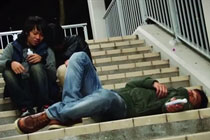
Black Money Rolling In
Lung, aged 20, frequently went to nightclubs on the Mainland to have fun and to take drugs. He gained the trust of a drug dealer and was allowed to take some drugs back to Hong Kong for sale. Lung invited friends to his home for drug parties.
Lung also took some extra cash from an ATM machine. He thought he was enjoying good luck, but is that the case?

The Cough Syrup Driver
Dragon, a 17 years old boy, has a habit of consuming cough medicine with his friends. They even drove someone else’s car for excitement…

The “Gift” Credit Card
Jaycee and his friend, Hayden, found a lost wallet. They thought it was an opportune gift, but instead, the wallet is leading them into trouble.

The Principal’s Thieves
Fai and Ming came to know that the school stored expensive lost property and confiscated items in the Principal’s Office. They decided to sneak into the Principal’s Office…

The Little Drug Dealer
Ho Ming, a Form 4 student, wanted to earn quick money. He decided to become a drug dealer at school. What problems and tragedies will he create?